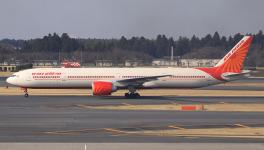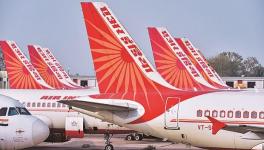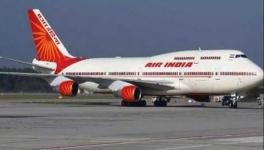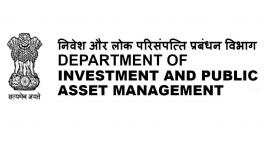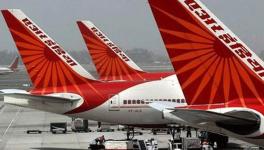Jet Airways’ Wind-up Is Windfall for All — Except Air India
Image for representational use only.Image Courtesy : NDTV
In an air travel industry where all scheduled airlines, private or otherwise, have been struggling to stay afloat, the financial collapse of Jet Airways came as windfall for other airlines in the country.
But while private carriers have gained significantly through interim allocations of Jet’s routes and slots and what-not and are fighting over the booty left behind by Jet, the state-owned Air India has received what looks to be the bare minimum the government could get away with.
Jet Airways — India’s oldest and once the largest private airline — suspended operations entirely in April (after steadily reducing capacity over previous months) and was taken to bankruptcy court in June.
At the end of April alone, the market share of IndiGo — already the largest airline by domestic market share with 46.9% by March 2019 — had reportedly risen to 49.9%.
The government has extended the period for the temporary (three-month) allocations of the airline’s routes and rights to other airlines till October-end, when the summer schedule ends and up till when Jet’s insolvency proceedings are likely to be completed.
IndiGo, SpiceJet and GoAir — the three leading low-cost carriers in India — are reportedly on their way to registering “record profits” in 2019-20, as per aviation consultancy firms.
In fact, IndiGo reported its highest quarterly profits ever with a 43-fold jump for the quarter ending this June 30.
SpiceJet is another airline that has benefitted immensely getting the maximum number of domestic slots in the March-June period – 43% of the slots vacated by Jet at Mumbai and Delhi airports, the busiest and most lucrative airports that allow an airline to operate the maximum number of flights. The airline has received at least 130 slots, including 68 prime slots in Mumbai.
“Given Delhi and Mumbai airports comprised 60% of domestic passenger movement during FY19, we believe these two airports are proxy of all-India market share gain by carriers at the expense of Jet Airways,” said consultancy Elara Capital.
IndiGo got 32% of these prime slots in Mumbai and Delhi, followed by GoAir that got 13%, Vistara which got 7%, and AirAsia India that received 4%.
“As a consequence, we expect SpiceJet’s market share to rise by 6%, followed by IndiGo at 5% and GoAir at 2%,” the Elara Capital report added.
SpiceJet also expanded its fleet by inducting 30 aircraft of Jet Airways on short-term leases, with 24 months being the maximum lease tenure.
The plum allotments to SpiceJet have got the goat of IndiGo and other private players — who have complained about unfair allocations — even though SpiceJet is still far behind IndiGo when it comes to market share.
IndiGo’s domestic market share was 48.1% in June 2019, while SpiceJet managed to capture 15.6% share, its highest in five years.
IndiGo has written to the Ministry of Civil Aviation complaining that allocations have been done in an arbitrary way and proper procedure was not followed.
The Tata Group, which operates Vistara and AirAsia India, have also opposed the manner in which allocations were made, including a government’s decision to allocate slots to those deploying new aircraft.
It is being speculated that SpiceJet is being favoured because its owner Ajay Singh is a dyed-in-the-wool Bharatiya Janata Party (BJP) man.
And what about Air India? Curiously, while private players have registered an increase in market share — Air India’s domestic market share fell from 13.9% in April 2019 to 12.9% in June 2019.
The ‘national’ carrier is reported to have got domestic slots for 22 flights, that’s all.
Indeed, there are no clear rules as to how these allocations are to be made.
Even though business papers have been mentioning various parameters that the government is taking into account, there are only guidelines for various kinds of allocations, including international allocations, said Mark Martin of aviation consultancy Martin Consulting, speaking to NewsClick.
“There is no standard procedure. Airlines simply wrote to civil aviation ministry with their requests and requirements and allotments were made. The allocations indeed are arbitrary,” he said.
It is not even clear what the total size of the domestic treasure left behind by Jet is. According to various reports, Jet had more than 800 slots across various domestic airports.
At 15-18 airports operated by the Airports Authority of India, Jet reportedly had between 115 and 120 slots.
However, it is not publicly known how many total slots Jet has vacated at airports in metros like Mumbai, Delhi, Hyderabad and Bengaluru, which are run in public-private partnership mode. Jet Airways is reported to have more than 440 slots at Mumbai and Delhi airports.
As of July 11, according to what Civil Aviation Minister Hardeep Singh Puri told Lok Sabha, a total of 209 slots vacated by Jet were lying unused at 31 domestic airports.
What about the international allocations — the most lucrative parts? After all, Jet Airways was the second largest scheduled international operator in the country, after Air India, with a market share of around 14% among Indian carriers in the 2018 fiscal.
Also read: How Modi Bypassed Norms to Try and Enable Adani’s Entry into Airport Business
Highly lucrative international routes, airport slots, foreign traffic rights and transit rights are up for grabs.
In May, the Ministry had said it would create a transparent standard operating procedure (SOP) to allocate foreign rights on temporary basis.
For now, however, according to an Aeronautical Instruction Circular (AIC), Air India has first claims to Jet’s international services.
“Due consideration shall be given to the operational plans submitted by Air India Ltd. before allocation of the traffic rights to the other eligible applicants,” says AIC no. 3 of 2017.
Air India and its subsidiary low-cost carrier Air India Express have together received additional seats to five destinations (Dubai, Qatar, London, Hong Kong and Singapore).
The total number of Jet’s international slots and routes and rights is not clear, but according to some news reports, what Air India has received accounts for around half of Jet’s international quota.
But even this quota that Air India has received is neither a favour nor is it much — since the other airlines do not even have the wherewithal to operate international flights, the government had no option.
Not to forget that a large part of Air India’s most lucrative international routes, including the Gulf routes, were taken away from it and given to the private players.
With a market share of around 17%, Air India is the biggest scheduled international operator in the country and earns around 65% of its revenues from international routes.
Why, then, did it not receive more from Jet’s international share — despite having the first claim and the highest capacity?
Private carriers are aggressively expanding their fleet and increasing their capacities to milk this unprecedented opening.
IndiGo and SpiceJet have reportedly bagged most of the highly lucrative bilateral flying routes of Jet.
According to reports, IndiGo has been allowed to operate 84 additional international flights a week, while SpiceJet is said to have been allowed an additional 77 weekly international flights. GoAir got 35 flights per week.
Vistara, a joint venture between Tata Group and Singapore Airlines — which is the only full-service carrier remaining in the country, besides Air India — will begin international operations from September-October. Vistara has permission to operate 28 flights per week to Dubai, Singapore and Thailand.
According to by ICICI Securities Ltd., IndiGo increased its international capacity share by 4% from the first two months of 2019 fiscal to the first two months of 2020 fiscal, while SpiceJet grew from 22% to 24% in the same period. GoAir’s international capacity rose to 10%,
Air India has increased its international capacity by only 1% in the first two months of 2020 fiscal.
This leaves the field open to international carriers, which already had 61% share of international traffic in 2017-18.
But why has Air India received so little? It can’t be down to allocation rules, since there are no rules.
“Air India, despite its debt burden, and IndiGo are the two most stable airlines in the country. Then how is it that SpiceJet, which went bankrupt six times since began, has received the lion’s share?” questioned Martin.
Even as the government is determined to privatise Air India — after it failed to find any buyers last year — does the government not want to realise at least a good value for the national carrier? Why is it wilfully making things worse for Air India?
The airline was unfairly sunk into debt, thanks to destructive government decisions over the past decade that included buying excessive number of aircraft, merging of Air India with domestic state-owned carrier Indian Airlines — at a time when both were market leaders — and giving away of all the lucrative foreign routes to private airlines.
And even as private carriers are now complaining — in the matter of Jet allocations — about a possible monopoly by IndiGo, selling off Air India will actually lead to a real monopoly by the private sector.
With no state-owned airline to keep a check on the prices charged by private carriers, the air fares would zoom sky-high and the travelling consumer would be the real loser.
And what about the not profitable routes and more remote areas in the country that Air India connects at affordable prices? Looking for profit, private carriers would either not ply these routes or charge a bomb.
In any case, going by the state and track record of private airlines — more than a dozen carriers such as ModiLuft and East-West Airline and Sahara and Kingfisher have shut down (or been bought over) over the past two decades — privatisation is not the answer to get Air India out of trouble.
In fact, the government is taking on more debt to clear off part of Air India’s debt — it plans to raise Rs 22,000 crore from the bond market, with Indian government giving sovereign guarantee for Rs 15,000 crore — in order to make it more attractive to private buyers. Why not invest that amount in Air India instead and help it turn around?
Indeed, Jet’s closure was a golden opportunity for the government to turn Air India around, but the airline was not even allowed to take it up.
Let’s not forget that private businesses only work for profit. In fact, a parliamentary panel report noted that private airlines were charging 8-10 times more than the normal fares during the festive season.
The panel found IndiGo to be the “worst performing” airline for consumers — even as Air India had the best luggage policy.
“Every single member (of the panel) is disgusted with the way some private airlines are operating, but more so with IndiGo, it is discourteous. The airline is very rigid, IndiGo even charges for one-two kg overweight, this has not been taken very well and the committee is looking into the matter seriously,” the parliamentary panel chairman had said.
If Air India is sold off, this is the future that awaits the air-travelling consumer in one of the world’s fastest-growing air travel markets.
Also read: Another Airline Takes a Dive in India
Get the latest reports & analysis with people's perspective on Protests, movements & deep analytical videos, discussions of the current affairs in your Telegram app. Subscribe to NewsClick's Telegram channel & get Real-Time updates on stories, as they get published on our website.










